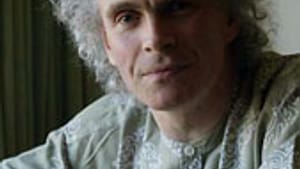Stay in the Loop
BSR publishes on a weekly schedule, with an email newsletter every Wednesday and Thursday morning. There’s no paywall, and subscribing is always free.
(In a word: Yes.)
DAN COREN
If you read the Inquirer, you’ve no doubt noticed the Simon Rattle love-fest that led up to and continued through his recent guest conductor stint with the Orchestra. First, a breathless, gossipy account by David Patrick Stearns of the complications of Rattle’s romantic life. Then, an ecstatic review by Peter Dobrin of Rattle’s reading of the Bruckner Seventh, followed by Stearns’s extolling the virtues of Rattle’s choice of a William Walton symphony. Finally, more glowing reviews of Rattle’s final concerts, preceded by a long profile, by Stearns, of the Russian composer Sofia Gubaidulina, whose Feast During a Plague” received its Philadelphia premiere under Rattle’s baton the week of February 12th.
As fine a conductor as Rattle may be, all this gaga adulation seemed very suspect to me. A few years ago, the Orchestra’s management fell in love with Rattle on the rebound (“Oh, I’m so over that cad, Riccardo. But that dreamboat Simon…? I think he’s going to ask me out!”) and even today Rattle is still regarded as the man who got away. Moreover, I’ve learned to recognize Dobrin’s lavish praise of any visiting conductor as salvos in his continuing war against Christoph Eschenbach.
Finally, I was very skeptical about how much difference any particular visiting conductor, no matter how good, could make in just a few rehearsals. The Orchestra plays at such a high level as a matter of course that I couldn’t imagine standard repertory (like the Brahms FourthSymphony, which closed Rattle’s final concerts) sounding distinctly different under anybody’s leadership. So, even though, because of the Brahms, I had looked forward to the concert of February 17th as one of the high points of my Orchestra subscription series, and even though Stearns’s article on Gubaidulina had made me eager to hear her music, I also went with a large journalistic chip on my shoulder.
Let me tell you, never has being proved wrong been so enjoyable. First, the Gubaidulia. Dobrin, in the Inquirer, wrote:
“[The] 25-minute work … is proof that great ideas transcend issues of style. The work is up there on the dissonance meter, but it is so startlingly original, so aesthetically singular, that it captures your attention solidly from its opening strident brass fanfare to an emotionally equivocating end.”
Yet, dissonant as the music was, it was filled with gorgeous orchestral textures, especially string textures that made me recall, of all things, Rimsky-Korsakov’s “Russian Easter” Overture, that made me feel connected with a century of Russian musical tradition.
But I was really unprepared for what happened in the Brahms Fourth. Rattle didn’t use a score, and, for long stretches of time, he didn’t even conduct in the usual sense – that is, he didn’t beat time and in fact just let his baton hand hang at his side. If Muti conducted as if he was a race car driver, controlling the Orchestra as if it were a Maserati going at 200 miles per hour, then Rattle was like a jockey riding a great horse, giving guidance on the few occasions it was necessary, but basically letting the thoroughbred run its own race. And yet, from beginning to end, he obviously had the orchestra’s rapt attention. As Stearns put it so well in the next day’s Inquirer:
“Every motif had a sense of consolidated insight that gave the impression Rattle had been directly conferring with the composer and knew what to do with a certainty that's seldom found anywhere in this world . …[His] way of touching the symphony's molten core came with a sense of progression that kept the piece moving into new emotional ground.”
Before the concert, I had run into Brad Smith, conductor of Penn’s student orchestra, who was also in attendance and had the good fortune to sit in the seats behind the stage, facing the conductor. The next day, he graciously entertained my attempts to find out Rattle’s secrets. In the end, Smith validated what I already knew from my experience as a choral singer: If a conductor shows that he possesses complete mastery of the music (something a performer can tell in a few seconds), and if he can make an emotional connection with the players, magical things can happen.
I asked what it was like to see Rattle’s face as he conducted. Smith replied: “He looked like he was having a great time!”
It would be nice to leave it at that, but one aspect of this concert distressed me almost as much as the music elated me.
As a child, I received virtually no traditional religious upbringing, but in my family that purpose was largely served by attending services in New York City’s Great Temple of the Standard Classical Repertory, a.k.a. Carnegie Hall. Although I have attended concerts regularly all my life, I can literally count on the fingers of one hand the number of times I have heard live performances of any given symphony, concerto or quartet. The “Pastorale” is my favorite Beethoven symphony; when Eschenbach conducts it on February 24th, it will be only the third or fourth time I can remember hearing it in concert. So I regard the opportunity to hear a live performance of a Brahms symphony as no trivial matter.
There are 30 seats (101-130) in Row C of Verizon Hall’s Orchestra Tier. For our Friday evening Orchestra subscription, my wife and I occupy 121 and 122. They are fabulous seats. On this particular evening, a single gentleman sat to my left in 123. To his left and to our right, there was … nobody! Nothing but empty red seats in the entire row. To be sure, that row was an anomaly. But I would guess that the hall was, at best, two-thirds full.
I asked Katherine Blodgett, the Orchestra’a director of media relations, for some feedback on this subject. She allowed that sales for these concerts had been “a little soft.” She speculated that, perhaps because the concert contained a new work, many subscribers had exchanged Friday night’s tickets. Although she found hope in the fact that a large number of students (which, in all I honesty I didn’t notice) had shown up for rush tickets at the last moment on both Friday and Saturday nights, I’m disappointed by what all this says about the Orchestra’s patrons.
And what about the power of Philadelphia’s musical press? The Inquirer’s food critic Craig LaBan can determine the fate of a restaurant by the number of bells he gives it. If Steven Rea or Carrie Rickey give a movie three or four stars, you’d better get to the theater early. But despite three weeks of rave reviews and previews— what amounted to free advertising for the Orchestra by Dobrin and Stearns— a disturbing number of people who had, I assume, already paid for their tickets passed up the opportunity to hear one of the world’s great conductors perform one of the greatest symphonies in the literature.
To view a response to thiss article, click here.
Sign up for our newsletter
All of the week's new articles, all in one place. Sign up for the free weekly BSR newsletters, and don't miss a conversation.

 Dan Coren
Dan Coren
